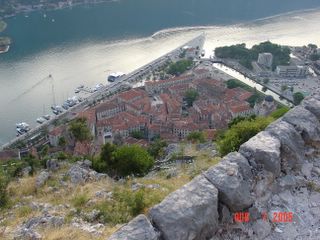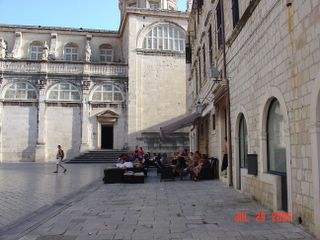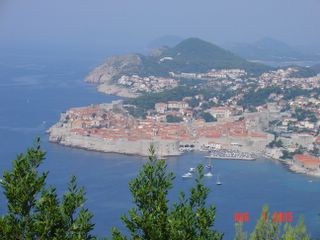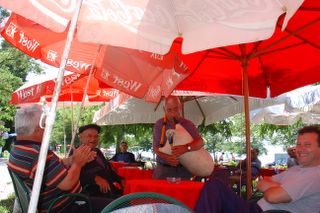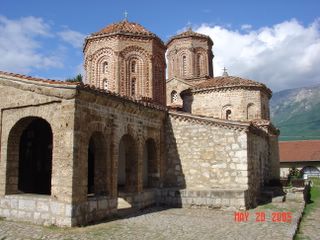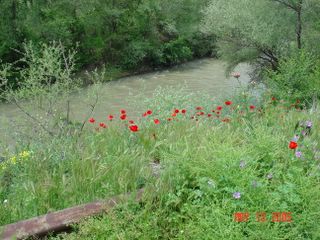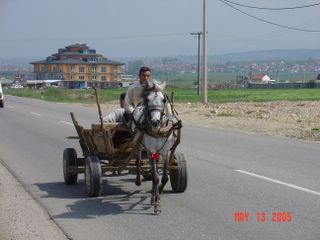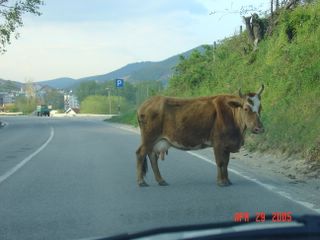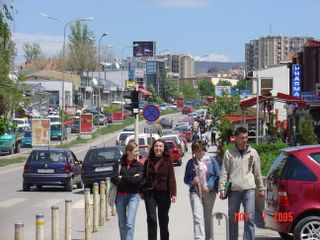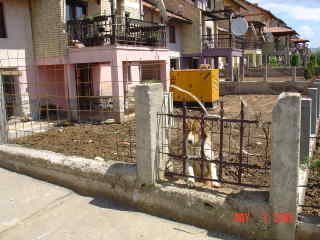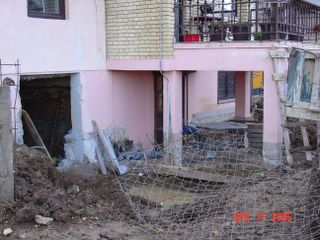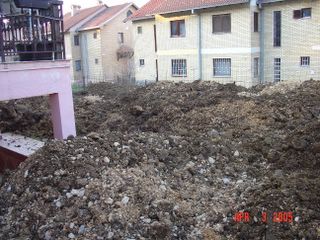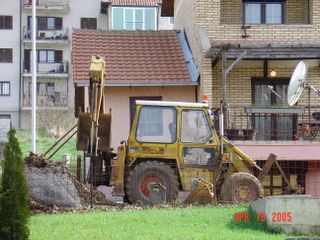XIV – A promise kept, a visit to a court, a winery and a long lunch; I turn older; Montenegro and Croatia; Crumbling infrastructure and cows; Jo Negociata Vetevendosje
1
The president of the Municipal Court in Rahovec promised to invite Ken the USAID Mission Director, The president of the Supreme Court and myself to his court. He also promised a visit to the winery and a big lunch. He made good his promise and we were all to meet at the Municipal court in Rahovec. Whenever the Mission director goes anywhere there is an entourage and someone has to be responsible for the “program,” the “someone” being a USAID contractor, in this case our project. I had a couple of our staff members contact the judge and make a pre-trip foray to Rahovec to work out details and the judge’s agenda. Lunch, though hosted by the judge, would be on our project.
There was an appropriate assemblage at the court on that morning; the president of the Rahovec Municipal Court – the host, the Mayor, several other judges of the court, and the President of the District Court of Prisren, the Rahovec Municipal court being in the Prizren District. The President of the Supreme Court brought two of his colleagues and Ken had his driver, interpreter and four staff people. I had my two advance people, Enver and Agon.
In the judge’s office the Mayor gave a few welcoming remarks as did the judge. Ken gave a thank you speech and we all got up and took a quick tour of the court. From the court we went to the Ravovec winery. The winery is one of the largest in the region if not all of Europe. The tour was limited to a visit to the wine cellar and some tasting as an employee described the winery and the plans for its privatization. It is still a publicly owned enterprise (one of the former socially owned properties being gradually taken over by private investors.) We received boxed gift bottles as we left.
Then came lunch. Appetizers of dried meats and peppers stuffed with cheese and various local cheeses and huge plates of salads. There was toasting with the finest locally produced nectars. There were a few more speeches. Then the meat began to arrive. Veal platters with vegetables and potatoes, and finally huge plates of lamb were placed from one end of the long table to the other.
There is a tradition in this part of the world. Lamb is a meal of choice for these events and the head, stripped of skin and well roasted as the other pieces, is always placed in front of the guest of honor. At an appropriate time, the guest of honor breaks the head open with his hands and has the honor of eating the first of the delectable morsels therein. There are only two selections from the inside of the head; brains and eyes. Ken was a trooper. Placing thumbs on the insides of the neck hole and fingertips on the top of the cranium, he broke the cooked skull into two halves. He quickly forked out an appropriate piece of brain. Not wanting me to feel left out he insisted that I take the second taste. Fortunately the nectars had flowed freely until that time making it easier to not offend the host. It is also fortunate that the size of the portion is of little consequence, it is the act of partaking that is important.
The meal lasted over two hours. No one was going to work for the balance of the afternoon and we had over an hour drive back to Pristina. For Ken and I, it was more than a good will mission, it was a cultural event.
2
My birthday is the twenty-seventh of July. Fatmir, our new accountant, shares the same birthday. The staff prepared a small party for the afternoon. They had a cake and drinks and I received a book loosely called the Albanian Code. It is the Code of Leke Dukagjini. In Albania the code was passed down verbally over the centuries and was reduced to writing about a hundred years ago or less. I was told that virtually every Albanian home has a copy. Even though it is considered archaic and is said to no longer be followed, it explains much of why things are what they are here. For example, it says “There is no fine for an offense to honor. An offense to honor is never forgiven.” And “An offense to honor is not paid for with property, but by the spilling of blood or by a magnanimous pardon.” In the rural villages especially, blood feuds remain a significant problem. The hatred between Serbs and Albanians is similarly better understood upon reading the ”code”. From the perspective of many Kosovar Albanians, the actions of the Serbs that resulted in the injury or death of loved ones are something that is unforgivable. Even one of our lawyers, Edita, talked recently about her former primary school classmates who she knew were either killed or are still missing; their pictures are attached to the fence outside the government building in downtown Pristina. She struggles to find a reason why they died. She struggles to find a reason why she survived. She has a more enlightened view on the subject than is expressed in the Albanian Code, but even her view falls short of forgiveness.
As Americans we see the world differently. On the one hand it is difficult for us to understand the feelings of the Albanian Kosovars. Except for 9-11 we have not experienced anything like what they went through. We did fight a number of wars and I have often pointed out that we are now good friends of the Germans, the Japanese and now even the Vietnamese. That approach was not very effective with Nick, my former landlord. Gaz, Nick and I were having a coffee recently and discussing the issue of putting the hatred behind and moving forward. Gaz is all in favor of this approach. Nick said it cannot be simply ignored and put behind. I told the story of the Kosovo Assemblyman with whom I had dinner a couple of months ago. He offered that Kosovo needed to put the hatred behind and move forward. He expressed that the war resulted in neighbors now hating one another simply because of ethnicity. I reminded the assemblyman that he had been a political prisoner. He said that he had been such for ten years, but that it wasn’t his Serb neighbors and friends in Kosovo who did that to him. Nick was still not ready to abandon his view.
I tried a different approach. I said that we forgive for ourselves not for our enemies. By forgiving and putting it back, we are mentally and indeed physically healthier. Ongoing hatred festers within us and we suffer for it. Nick left that morning coffee still disagreeing and offering to discuss it further on another day. Late that afternoon, I received a call from Nick. He said that he had thought about it all day and that he now agreed that I was right. Even though we move forward by inches, we are grateful that the movement is forward nonetheless.
3
Sharon and I took a well deserved and long overdue vacation. We went with Ken and Viviana. We each drove our own cars and crossed the border of Kosovo at Peja into Montenegro. Montenegro is the last of the former Yugoslav republics to remain aligned with Serbia. On the maps, Kosovo is still a part of Serbia and officially has not been separated. Whether it is ever removed will be determined as a result of the “status talks” that are ongoing. Montenegro will have a referendum vote in March to decide if they will remain with Serbia or become a separate state. Polling indicates that about sixty percent of the Montenegrins favor independence.
Peja lies at the foot of the mountains and the border crossing is at the end of a long series of hairpin turns and switchbacks. There are panoramic views of Kosovo spreading across the valley below. As we climbed, we could see hamlets and quilted patches of crops as they glittered and baked far below under the hot July sun. We turned our back to the panorama and found the Kosovo border station ahead of us.
The Montenegrin border station is about five miles form the Kosovo station. From there, we spent the next several hours winding our way through craggy mountains, around bends and turns, through tunnels and over bridges spanning deep gorges. The mountainsides were spotted with tile-roofed houses and we slowed through small outlying villages. Mostly green with trees, the mountains would suddenly be broken, leaving sheer slate-gray cliffs, then, steering around a sharp turn, the mountains rolled green again. The drive was breathtaking and exhilarating. The beauty unequalled anywhere.
Finally we came down into a more flat area and the Montenegrin capital of Podgorica. We stopped for a late lunch then on to the sea. The road from Podgorica quickly rose up into the mountains again and the same terrain we had been driving until we finally, suddenly, were overlooking the Adriatic Sea. As I looked over the harbor town below, I regretted for a moment that the project proposal on which I had been included two years earlier was not successful. We wound down to Budva on the coast. In Montenegro, the mountains end in the sea. Then, following the shore, we headed north toward the Croatian border until we reached our hotel in Bijela, half hour south of the border.
The hotel is owned by the Montenegrin government and profits go to assist the orphanage that is immediately next door. The hotel is small, eleven rooms in total. The facilities were clean and modern. The service, some of which was provided by the older residents of the orphanage, was excellent. The orphanage has one hundred children, divided equally between older and younger, including a number of infants.
Next day we spent back up the road in the city of Budva at the resort/monastery island of Saint Stephan. There is an admission charge then twenty-eight euros (thirty-five US dollars) for the eight soft drinks we thirstily consumed. On the Adriatic coast, merchants are acutely aware of the attraction of its beauty and their short season.
We checked out of the hotel next morning and proceeded to Croatia and the walled city of Dubrovnik. Our hotel was moderately priced and adequate in the circumstances. We were in the height of the season and the prices of hotels so reflected.
Inside the main gate of the city, the famous marble street stretches to the back gate at the harbor. Turning right at the church we walked to the far corner of the city to another church bearing the scars of the war of the 1990’s. The Serbs did not spare the historically significant city. Most of the damage has been repaired. Roofs were meticulously rebuilt. All damage that could be was restored to its primeval beauty. The pock marks from the strafing that the church experienced are difficult to repair and are now a lasting reminder of the violence that occurred so recently in the ancient city’s past.
We spent the following day on a boat visiting three islands along Croatia’s Dalmatian coast. The next day was spent on the beach. In the morning we left for the Montenegrin city of Kotor.
Situated at the very end of the long narrow Bay of Kotor, the walled city is tucked beneath a steep mountain. The wall of the city extends up the side of the mountain for several hundred meters. Kotor was one of a very few places in the region that the Ottomans never conquered. A quick look at the city tells that story. Ken and I climbed the steps along the wall to the fortress on top of the mountain. The city and bay lay far below. An enemy can be seen coming for miles. It is an impressive and impregnable place. The actual walled city has all the charm and less the number of tourists of Dubrovnik. We stayed at a small hotel inside the walls. We ate a nice meal at an outdoor café. The waiter was from Belgrade. Monetnegro will have a referendum in March to determine if they stay with Serbia or become independent. Serbia has apparently agreed to abide by the vote. The waiter came to visit the area on vacation and met a girl. The same story all over the world. We told him we were form Kosovo. He said that Kosovo would never be a part of Serbia again, it was gone for good. And the Serbs from Kosovo who took refuge in Serbia after the war on 1999, he said, would not move back.
When questioned about the upcoming referendum, he said that Montenegrins and Serbs were basically the same. To myself I questioned that conclusion. We were told that sixty percent of the citizens currently support independence.
The ethnic tensions were ever apparent. The Montenegrin coastal city of Ulchin is the resort town of choice for most Kosovar Albanians. The young waiter was talking about all the towns along the coast. When he referred to Ulchin, he said it was also a beautiful city, but it was too much like Kosovo. We took that to mean, too many Albanians.
The trip home was uneventful and as awesome as the trip over. I was struck by the fact that a place with such beauty could have such a long history of violence and hatred. I added it to the list of inconsistencies I have experienced in this corner of the world.
4
One weekend morning I heard what sounded like a flowing mountain stream outside our house. Upon inspection, I saw that the street beside the house had become a virtual gurgling river of water. It flowed down the hill and across the street below. On the way, it splashed and churned over potholes, making what looked like mini rapids. It was a lot of water. I followed the river to its source. From the side of a hill above the parking lot of the Engineering Faculty across from the house, a large stream of water flowed, carrying mud onto the parking lot and cascading water down our street. A broken water main.
By Kosovo standards, this leak was repaired immediately, well, within two days. There is a broken main on “San Francisco” Street that flowed for weeks, maybe months. Then there are the man holes that crumble beneath the steel covers resulting in potholes that will surely swallow your tire if not the whole car. The infrastructure here dates to the socialist days and, in addition to its age, is of poor quality. Crumbling steps, broken sidewalks, potholed streets, and so it goes. As I said in an earlier chapter, people keep one eye on the ground at all times.
No more had the river stopped than the cows came. Two cows wandering the streets eating grass, weeds and garbage, and not a herdsman to be found. They passed our house fairly quickly. I have learned not to be surprised here.
5
Status talks will begin soon in earnest. These are the talks between the Serbs and the Kosovars to determine the status of Kosovo. The Kosovars want independence and the Serbs want Kosovo to remain a province of Serbia. The “contact group”, the United Sates, Germany, France, England and Russia, want a peaceful resolution very soon. Talk is of a European protectorate of some sort that will make neither side happy and guarantee that NATO’s KFOR troops will remain for a long time to come. The stenciled signs painted on walls and buildings read, “Jo negociata” “Vetevendosje!” Loosely translated this means, “no negotiation, self determination.” It remains to be seen how prevalent this sentiment is, and how determined those who propose it are to make it a reality. As the UN makes its plans to leave, things again become more … interesting.
Until next connection,
Dan
Friday, September 16, 2005
Sunday, July 03, 2005
XIII Another trip to Greece – almost; Poppies again; Close security; No pictures please; In search of a bus; Lake Ohrid in Macedonia – Tito - Yugoslav
XIII Another trip to Greece – almost; Poppies again; Close security; No pictures please; In search of a bus; Lake Ohrid in Macedonia – Tito - Yugoslavia falling down; Canada Day and the Fourth of July; Explosions, the usual reminders
Dear Friends and Family,
1
Sharon came back in time for her birthday on the 29th of May. Lily’s Birthday is the 30th. Gaz and I planned a trip to Greece for the long weekend. Memorial Day is a long weekend for our staff and for us. Our staff get USAID holidays which include all local holidays and all American holidays. Those total 17 days. We, on the other had, get NCSC holidays – ten. Memorial Day is one we do get, The UN and locals work on that day however. All of this is just one more of the many things that in the US is taken for granted, but here becomes a rather involved matter. This happens virtually every holiday, local, US or other, some people are off others not.
We left early Saturday morning taking our Michigan registered Cougar. The border crossing into Macedonia was smooth and uneventful. My insurance, purchased at the border several weeks earlier, was still in effect. The road to Greece through Macedonia to Greece is good; limited access four lanes until the southern section through the mountains where it is yet unfinished. There it is two lane road, but well maintained. We made good time and arrived at the Greek border within three hours.
A week or so before the trip, there was an announcement that Greece had decided to recognize the UNMIK Kosovo vehicle registrations - “KS” license plates. This would allow Kosovars to travel to Greece, assuming they have a visa. KS plates are recognized only in Macedonia, Albania, Bulgaria and Montenegro, severely limiting the travel options of Kosovars with cars. As we approached the border, Gaz was driving. Gaz and Lily have UK passports, even though they are Kosovar Albanian. In my two prior trips to Greece with our US registered car, we were never questioned nor asked to purchase insurance at the border. This was the experience of all other Americans with US plates.
For whatever reason, on this trip the not so friendly Greek customs agent told us we had to get insurance and directed us to a building on the far side of the border station that I had not seen before. Sharon and Lily crossed on foot to a little café on the Greek side of the border. Gaz and I went to get insurance, even though I was surprised we were required to do so. In the insurance office two men sat at metal desks. We told them what we needed. Between the two of them they managed to understand. One man wrote in pencil on a small sheet of paper 180 euros. At the insurance office in Macedonia, the agent has a rate schedule that can be examined and is always the same – 55 euros for two weeks, 70 euros for one month, 110 euros for two months etc. I asked for how long the 180 euros was good for. The man at the other desk said “one month.” Gaz and I went back to the border agent who was of no further help. We went back to the Macedonian border station to see if we could buy insurance there, without success. We finally decided to spend the one hundred eighty euros (over $200) for the weekend, this, before we hired a room or ate.
The men in the insurance office were now less friendly and found ways to busy themselves with other people and things while we waited. Gaz suggested we ask the women if they thought we should spend the money. They were having coffee on the Greek side of the border. We walked there leaving the car in the no-man’s-land between the two stations. Lily and Sharon were of a like mind that we should not spend the money. As we discussed our options, Gaz suggested we go to Bulgaria. We checked out of Greece, got in the car, crossed through the Macedonian station and began our trip to Bulgaria.
Bulgaria borders Macedonia on its west and Greece on its south. We needed simply to travel about half way across Macedonia to get to the border, less than 200 kilometers. The road was good, two lanes and wound its way through mountains, searching for the border with Bulgaria. Through the last Macedonian village and into the country we came to a border crossing. This was not a busy place, but pleasant on a sunny afternoon. A rural setting with rolling hills; the mountains left behind us to the west. Unlike the busy crossing we use going from Pristina to Skopje where cursory inspections and quick swipes of passports still often result in long lines. At this quiet place, the border guard instructed us to turn off the engine. The process was thorough and proper, the people friendly. Finally we were allowed to move to the Bulgarian station. Again, we shut off the engine and waited patiently as procedures were followed. There were some walkers, a truck; no one in a hurry. We were not required to buy insurance, a savings from our earlier experience, of 180 euros.
We went to a small city of around thirty thousand called Sandanski. It is know for its therapeutic hot springs. The trip through the rolling countryside gave us a flavor of this serene, neat and poor place. We found more horse drawn carts than we normally
encounter in Kosovo or Macedonia. Farms growing vegetables, similar to what Macedonia offers, and grape vineyards for wine, also as in Macedonia and Kosovo, lined the winding road. After a few wrong turns we arrived at our destination.
Like all Yugoslavians older than fifteen, Gaz and Lily speak fluent Serbian (Serbo-Croatian officially) and are familiar with the Cyrillic alphabet used in the road signs in Bulgaria. Bulgaria, like Albania, was closed during the “Cold War” years. While the Yugoslavians under Marshall Tito traveled freely through Europe and often to Greece, they were permitted transit only through Bulgaria; twelve hour visas, only enough to get from one border to another. The result is a society that today speaks only Bulgarian. Very little English is spoken there. Serbian as a Slavic language is close enough to Bulgarian that Gaz and Lily could communicate.
Sandanski is relaxing city with good shopping, large parks with walking paths, a cascading river and hot springs, the 76 degree centigrade water piped to the surface for people to splash on their face or take home in jugs. There are clinics for therapy of all sorts and the largest hotel has a medical center that offered cosmetic surgery along with the therapeutic treatments. We simply enjoyed the sun, a sauna and two birthday dinners at very reasonable prices, one for Sharon and one for Lily.
2
The poppies are in bloom here again. They grow wild along the roadsides and in fields. They are so striking. Last year I made an analogy to spatterings of blood in a region replete with wars throughout its long history. Gaz and I were driving one day and I commented on the fact that the poppies were blooming. He told me that local legend says that the poppy fields mark sites of battles that occurred over the course of Balkan history. He then described one such site from the conflict between the Serbs and Albanian Kosovars in the late 1990’s where a number of people were killed. Poppies have bloomed there since then. There are many poppy fields in the former Yugoslavia.
3
We would say bodyguards, here they call it “close security.” I do not have close security. I recently hired a driver and although Rama is often a companion at lunch, he can hardly be considered close security. I have been out to dinner with Tom many times and as director of the UNMIK Department of Justice, he is entitled to close security. I am accustomed to having them sitting discreetly at a neighboring table. Some, like Tom’s, are KFOR solders in uniform. Others are men and women in suits with coiled wires trailing from their ears and snaking into the back of a suit coat. The Serbian lawyer who is prominent for being on a number of committees has KPS (Kosovo Police Service) close security. Ministers of the government have close security, and so on. If either the UN or the government thinks a person is a potential target, they get close security.
Tiffany’s is a popular spot for internationals and locals alike. The leader of the ORA party sat at the next table as we finished our lunch. His office had been fire bombed recently according to Edita. Then a soldier sat at a nearby table, one was by the door, several were outside. On the patio outside the sliding glass door next to our table a member of the Carabinieri – the Italian KFOR – moved nervously with his automatic weapon at the ready. He was a character from a movie set with his dark blue uniform pants folded into the tops of his black boots, his dark hair pulled into a short pony tail under his red beret. He was tall, lean and appeared serious about his undertaking.
And then more came and more. Close security were everywhere. Some were in uniforms, some in suits. Edita recognized the Minister of Finance and another minister, then several. It was a meeting. Close security outnumbered the participants by more than two to one. Having finished our meal and fearing a mistake by one jittery close security person setting off a chain reaction, we left. The road was closed for security; we walked to the main street.
4
The events of March 2004 destroyed a number of Orthodox churches. Since then, many have been guarded regularly by KFOR troops. John was here again and we took a Sunday drive down to Ferazi. There, an Orthodox church and a masque are literally next to each other. It makes an interesting picture. There a few places in Kosovo similar to this, but in Ferazi the two are exactly next to each other. John wanted a picture. He got a story to tell instead. As he raised his camera, several KFOR guards emerged from bunkers in the church yard and began waiving him off – no pictures please. His pictures are now of Sharon and I on the sidewalk a bit distant from the church, but with the church and masque n the background.
We left downtown Ferazi for the Ben-af store on the Skopje road. The Ben-af store is the one that was destroyed last summer by a car bomb. Something about competition. John remembered the story and as we left he wanted a picture. The guards who are now constantly in the parking lot waived him off - no pictures please. We try hard to believe that life here is normal but unusual things seem to happen with enough regularity to remind us that post-conflict environments do not normalize very quickly.
5
Dear Friends and Family,
1
Sharon came back in time for her birthday on the 29th of May. Lily’s Birthday is the 30th. Gaz and I planned a trip to Greece for the long weekend. Memorial Day is a long weekend for our staff and for us. Our staff get USAID holidays which include all local holidays and all American holidays. Those total 17 days. We, on the other had, get NCSC holidays – ten. Memorial Day is one we do get, The UN and locals work on that day however. All of this is just one more of the many things that in the US is taken for granted, but here becomes a rather involved matter. This happens virtually every holiday, local, US or other, some people are off others not.
We left early Saturday morning taking our Michigan registered Cougar. The border crossing into Macedonia was smooth and uneventful. My insurance, purchased at the border several weeks earlier, was still in effect. The road to Greece through Macedonia to Greece is good; limited access four lanes until the southern section through the mountains where it is yet unfinished. There it is two lane road, but well maintained. We made good time and arrived at the Greek border within three hours.
A week or so before the trip, there was an announcement that Greece had decided to recognize the UNMIK Kosovo vehicle registrations - “KS” license plates. This would allow Kosovars to travel to Greece, assuming they have a visa. KS plates are recognized only in Macedonia, Albania, Bulgaria and Montenegro, severely limiting the travel options of Kosovars with cars. As we approached the border, Gaz was driving. Gaz and Lily have UK passports, even though they are Kosovar Albanian. In my two prior trips to Greece with our US registered car, we were never questioned nor asked to purchase insurance at the border. This was the experience of all other Americans with US plates.
For whatever reason, on this trip the not so friendly Greek customs agent told us we had to get insurance and directed us to a building on the far side of the border station that I had not seen before. Sharon and Lily crossed on foot to a little café on the Greek side of the border. Gaz and I went to get insurance, even though I was surprised we were required to do so. In the insurance office two men sat at metal desks. We told them what we needed. Between the two of them they managed to understand. One man wrote in pencil on a small sheet of paper 180 euros. At the insurance office in Macedonia, the agent has a rate schedule that can be examined and is always the same – 55 euros for two weeks, 70 euros for one month, 110 euros for two months etc. I asked for how long the 180 euros was good for. The man at the other desk said “one month.” Gaz and I went back to the border agent who was of no further help. We went back to the Macedonian border station to see if we could buy insurance there, without success. We finally decided to spend the one hundred eighty euros (over $200) for the weekend, this, before we hired a room or ate.
The men in the insurance office were now less friendly and found ways to busy themselves with other people and things while we waited. Gaz suggested we ask the women if they thought we should spend the money. They were having coffee on the Greek side of the border. We walked there leaving the car in the no-man’s-land between the two stations. Lily and Sharon were of a like mind that we should not spend the money. As we discussed our options, Gaz suggested we go to Bulgaria. We checked out of Greece, got in the car, crossed through the Macedonian station and began our trip to Bulgaria.
Bulgaria borders Macedonia on its west and Greece on its south. We needed simply to travel about half way across Macedonia to get to the border, less than 200 kilometers. The road was good, two lanes and wound its way through mountains, searching for the border with Bulgaria. Through the last Macedonian village and into the country we came to a border crossing. This was not a busy place, but pleasant on a sunny afternoon. A rural setting with rolling hills; the mountains left behind us to the west. Unlike the busy crossing we use going from Pristina to Skopje where cursory inspections and quick swipes of passports still often result in long lines. At this quiet place, the border guard instructed us to turn off the engine. The process was thorough and proper, the people friendly. Finally we were allowed to move to the Bulgarian station. Again, we shut off the engine and waited patiently as procedures were followed. There were some walkers, a truck; no one in a hurry. We were not required to buy insurance, a savings from our earlier experience, of 180 euros.
We went to a small city of around thirty thousand called Sandanski. It is know for its therapeutic hot springs. The trip through the rolling countryside gave us a flavor of this serene, neat and poor place. We found more horse drawn carts than we normally
encounter in Kosovo or Macedonia. Farms growing vegetables, similar to what Macedonia offers, and grape vineyards for wine, also as in Macedonia and Kosovo, lined the winding road. After a few wrong turns we arrived at our destination.
Like all Yugoslavians older than fifteen, Gaz and Lily speak fluent Serbian (Serbo-Croatian officially) and are familiar with the Cyrillic alphabet used in the road signs in Bulgaria. Bulgaria, like Albania, was closed during the “Cold War” years. While the Yugoslavians under Marshall Tito traveled freely through Europe and often to Greece, they were permitted transit only through Bulgaria; twelve hour visas, only enough to get from one border to another. The result is a society that today speaks only Bulgarian. Very little English is spoken there. Serbian as a Slavic language is close enough to Bulgarian that Gaz and Lily could communicate.
Sandanski is relaxing city with good shopping, large parks with walking paths, a cascading river and hot springs, the 76 degree centigrade water piped to the surface for people to splash on their face or take home in jugs. There are clinics for therapy of all sorts and the largest hotel has a medical center that offered cosmetic surgery along with the therapeutic treatments. We simply enjoyed the sun, a sauna and two birthday dinners at very reasonable prices, one for Sharon and one for Lily.
2
The poppies are in bloom here again. They grow wild along the roadsides and in fields. They are so striking. Last year I made an analogy to spatterings of blood in a region replete with wars throughout its long history. Gaz and I were driving one day and I commented on the fact that the poppies were blooming. He told me that local legend says that the poppy fields mark sites of battles that occurred over the course of Balkan history. He then described one such site from the conflict between the Serbs and Albanian Kosovars in the late 1990’s where a number of people were killed. Poppies have bloomed there since then. There are many poppy fields in the former Yugoslavia.
3
We would say bodyguards, here they call it “close security.” I do not have close security. I recently hired a driver and although Rama is often a companion at lunch, he can hardly be considered close security. I have been out to dinner with Tom many times and as director of the UNMIK Department of Justice, he is entitled to close security. I am accustomed to having them sitting discreetly at a neighboring table. Some, like Tom’s, are KFOR solders in uniform. Others are men and women in suits with coiled wires trailing from their ears and snaking into the back of a suit coat. The Serbian lawyer who is prominent for being on a number of committees has KPS (Kosovo Police Service) close security. Ministers of the government have close security, and so on. If either the UN or the government thinks a person is a potential target, they get close security.
Tiffany’s is a popular spot for internationals and locals alike. The leader of the ORA party sat at the next table as we finished our lunch. His office had been fire bombed recently according to Edita. Then a soldier sat at a nearby table, one was by the door, several were outside. On the patio outside the sliding glass door next to our table a member of the Carabinieri – the Italian KFOR – moved nervously with his automatic weapon at the ready. He was a character from a movie set with his dark blue uniform pants folded into the tops of his black boots, his dark hair pulled into a short pony tail under his red beret. He was tall, lean and appeared serious about his undertaking.
And then more came and more. Close security were everywhere. Some were in uniforms, some in suits. Edita recognized the Minister of Finance and another minister, then several. It was a meeting. Close security outnumbered the participants by more than two to one. Having finished our meal and fearing a mistake by one jittery close security person setting off a chain reaction, we left. The road was closed for security; we walked to the main street.
4
The events of March 2004 destroyed a number of Orthodox churches. Since then, many have been guarded regularly by KFOR troops. John was here again and we took a Sunday drive down to Ferazi. There, an Orthodox church and a masque are literally next to each other. It makes an interesting picture. There a few places in Kosovo similar to this, but in Ferazi the two are exactly next to each other. John wanted a picture. He got a story to tell instead. As he raised his camera, several KFOR guards emerged from bunkers in the church yard and began waiving him off – no pictures please. His pictures are now of Sharon and I on the sidewalk a bit distant from the church, but with the church and masque n the background.
We left downtown Ferazi for the Ben-af store on the Skopje road. The Ben-af store is the one that was destroyed last summer by a car bomb. Something about competition. John remembered the story and as we left he wanted a picture. The guards who are now constantly in the parking lot waived him off - no pictures please. We try hard to believe that life here is normal but unusual things seem to happen with enough regularity to remind us that post-conflict environments do not normalize very quickly.
5
Part of what we do in the project is to train judges and court personnel and to hold various meetings and workshops. John was here to train. We also had planned a week-long training in Lake Ohrid in Macedonia preceded by a working group meeting to help draft the law upon which Kosovo courts will be structured. We would rent a bus, take the working group participants to Macedonia then the bus would bring the second group for the training and pick up the first group and take them back. It was a bit tricky. The trip is about five hours by bus, so the bus needed to be the best we could find.
The low bid proclaimed to be the best in Kosovo. Gaz and I went to see his busses. Gaz summed it up when we got into the car to leave. “Quite frankly, I’m not that impressed,” he said. I agreed. Now we knew we needed to see the high bid even though, and maybe because, he proclaimed that his busses were the “best in the Balkans.” The only problem was that he operated out of Prizren, nearly two hours from Pristina. Gaz asked him to bring a bus to Pristina. These discussions went on for a few days until he called Gaz one day and said he was at the military airport picking up Turkish KFOR troops and could we go there to see the bus. We had a workshop going, but Gaz found me and we quickly left for the military airport. Neither of us had ever been to the military airport. It lies just beyond the commercial airport seemingly in the middle of well tilled fields. As we neared the commercial airport Gaz got a call from the driver. It seems that the bus was loaded with Turkish KFOR troops who were ready to leave, could we hurry. Within five minutes we were driving toward the fences surrounding the small terminal building and tarmac upon which rested a C-130 cargo plane with Turkish insignia on its side and tail. We drove through a gate and toward the row of loaded busses as though we belonged. No one stopped us. We found our bus and parked. We were greeted by the driver who quickly welcomed us aboard. We inspected the bus as thoroughly and rapidly as we could. The soldiers seemed friendly enough in the circumstances and I have no idea what the driver might have told them about who we were or why we were there. The bus was excellent and as a precaution we jotted down the plate number. Gaz called the owner and told him we wanted that bus.
6
Lake Ohrid in Macedonia is already becoming a European destination of sorts for conferences and vacations. An alpine lake in the mountains in the south of Macedonia on the border with Albania, Lake Ohrid has all the ingredients for a thriving tourist area. The border runs through the middle of the lake. The Albanian side remains undeveloped. On the Macedonian side, the socialist era hotels are being privatized and remodeled. The process will take several more years, but the process is well underway. The town of Ohrid is ancient with a modern tourist flare. It has a quaint harbor, shops and cobblestone streets winding up the side of a mountain. The resort hotels stretch along the shore and are variously on a bluff overlooking the lake or nestled along the shore with gravel beaches. Churches and monasteries lend quaintness to the scene. From our hotel on the beach, we could walk up a grade to a road that goes past the Gorica hotel along a bluff and ends at the fence surrounding the Macedonian government owned estate formerly a residence of Tito. Tito had such residences in all the best spots in the former Yugoslavia.
Without exception, our older judges and lawyers attending the meetings reminisced about the Tito days, the days of the former Yugoslavia. They talk of how they used to go to Lake Ohrid often. Now, they say, the border crossing makes the trip not as convenient. Many people in Kosovo and Macedonia talk of the days when everyone had jobs and money. They traveled all through the Balkans and beyond. There was peace. Everyone seemed to get along. Tito, for all his faults, was able to maintain a balance in the Balkan states that crumbled immediately on his death.
We went to town on one of the few afternoons when I could get away. We wandered up the cobblestone streets and past the shop of a photographer. It was in an old building. The door opened into a long hall lined with his photos and ended in a room overlooking the harbor. It was neither well kept nor maintained. The pictures hung on all walls and leaned against the walls on the floor in stacks. He spoke good English and was delighted to be able to show his art. As he described his photos, he did not describe the scenes by what was in the picture - such and such village, etc. - but rather told us what he saw when he took the picture. For example there were two empty and broken chairs on a stoop. One had a broken leg, the one next to it a broken back. He said, “here is a couple, he has a broken leg, her back is bad.” The picture of the old wrinkled woman with missing teeth and smoking a cigarette was mounted beside a similar looking old man with no cigarette. He described; “she is smoking a cigarette, he wants to smoke but he has no cigarette.” It was a interesting experience. We mentioned that we were there from Kosovo for a conference. He immediately began to look all through the piles on the floor and all about the room for a picture. I thought it might be of Kosovo. He finally pulled up a frame with two pictures in it. On the left a picture of an old abandoned classroom with a bench turned on its side and schoolhouse type trash on the floor. On the wall, a map of Yugoslavia, canted downward to the right with the color peeling. The second picture was a woman in the doorway of a traditional and old house, and a man on the steps that led down from the house. He was partially clad in soldier’s clothes – an old soldier. He was looking at her and she him. The photographer said, “see,” pointing to the map on the wall of the deserted classroom, “Yugoslavia is falling down.” Then he pointed to the couple in the second picture. “She is asking, ‘where are you going?’ He says. ‘I’m going down.’”
7
July 1 is Canada Day. Our Independence Day is the fourth of July. Here, this year, the US Office – the equivalent of an embassy if this were a country – held its Independence Day celebration on July 1. Our Canadian friends who work for KFOR invited us to a Canada Day celebration at the KFOR headquarters at Film City on Dragadon Hill on July 2. The Kosovars will celebrate our independence day on July 4.
8
On the night of July 2, Tom called looking for Matt’s number. He advised that three bombs went off that night. One in front of the UN headquarters, one near the OSCE (Office for Security and Cooperation in Europe) building and a third by the Kosovo Assembly building. I asked if there were any particular security problems. He said it was the usual reminder bombings. There are those who feel a need to remind everyone that there is a threat out there still. As status talks – the discussions to determine what Kosovo’s future will be - increase, so will the incidents of this nature.
Until next connection,
Dan
Sunday, May 08, 2005
XII Watching a new country grow; Prime Minister’s brother is shot; A new landlord and a new backyard; No inspectors; Stopped at a check point
Dear Friends and Family,
It is interesting watching a new country grow. I say country, but that is a word we never use here since Kosovo’s “status” has not been determined as of yet. “Country” is not a politically correct word to use in relation to Kosovo. The Serbs consider it a province of Serbia as it had always been. The Albanian Kosovars want it to be a country if it cannot be the fifty-first state or a part of “Greater Albania” (“Greater Albania,” “Greater Serbia,” and “Greater Macedonia” all overlap one another, ethnic conflict should be no surprise then). We say things like “Kosovo wide” or “across Kosovo” but never “country.” Status determination is promised soon. But even as status awaits, the society moves forward. Fueled mostly by international money from the resident internationals here in Kosovo doing work, like myself, and from expatriate Kosovars in neighboring countries working and sending money back, the local economy seems to be flourishing. Unemployment is still a major issue as is low wages, but construction is booming. It isn’t just through the new construction, prosperity reveals itself in other ways. I have already spoken about the super markets that have sprung up in the past year; Maxi Mart, Ylli bec; Ben-af, Inter Ex, the Scandinavian store with household goods and teak furniture, to name a few. There are other things that have come on the scene as well. On Bill Clinton Boulevard a video bill board went up several months ago, then another. Now there is a third on the Skopje road near the Victory Hotel. There is tree planting in the tree lawns next to the street that passes our office. Little by little, almost unnoticed by us locals, modern society is taking over Pristina.
A couple of weeks ago my bosses were here from Washington. We were at a meeting with the USAID Mission Director. He advised us that literally moments before our meeting the former Prime Minister’s brother was shot and killed in Peja. This is the Prime Minister who is now in The Hague awaiting trial for war crimes. All of his family members were involved with the KLA (Kosovo Liberation Army) in the days during and leading up to the war. One brother was in fact killed in the war. It is “rumored” that the KLA leaders became the crime bosses after the war. Regardless if that “rumor” has merit, the brother was shot and killed execution style by drive by shooters. When incidents like that happen everybody holds their breath. This could have been the incident to throw Kosovo into another riotous melee. It wasn’t, but there were a few days of tension.
I don’t know where the money comes from. Some say “don’t ask.” I live in a neighborhood of homes that have become desirable among those fortunate enough, through whatever means, to have money. My original landlord quickly sold my house to a nice family – Nick the young dentist making 200 euros per month working at the government clinic, his parents who are retired and his brother in Italy. The father was a teacher in Kosovo under the communist regime and taught something he wasn’t supposed to. Before he was arrested, some friends in the police department tipped off one of his friends who tipped him off and he went to Albania with his wife in the night. Now that the war is over here and the Serbs are gone and Albania is “open” again, the father came back to Kosovo. Nick, born and raised in Albania, came along with his wife and child. It is the brother in Italy who came up with the money. The price was 220,000 euros, I thought a bit steep. The brother works for a trucking firm in Italy where he provides the company with Albanian workers who work for less than Italians. Both the company and the Albanian workers appreciate the services of the brother, and, as a result, he has the ability to take care of himself and his family in Kosovo.
Things being what they are both here and in Albania, the brother decided to sell this house and buy property on the Albanian coast to build a hotel. He sees the infrastructure in Albania improving and resort areas becoming more accessible on improved roads. He sold this house for 230,000 euros (just over 300,000 US dollars) to a local guy who is a clerk in the faculty of economics (clerk in the school of accounting) at the University of Pristina. These are cash deals since banks here rarely make mortgages at this point. This is clearly one of the “don’t ask” situations since a clerk in the University likely makes a salary of less than 200 euros per month.
My new landlord never saw the inside of this house except for the time he came to meet me after he had bought it. He knows my neighbor. My neighbor convinced him to do some remodeling which he told me would be “drainage work” in the backyard. I live on a hillside so my basement opens to the outside, but the grade has never been taken totally down to the level of the basement floor. There is a small patio at that level only. First the workers came and cut an opening into the back wall below the garage and began digging the dirt out from under the garage. The dirt filled the back yard. Then came the backhoe and my satellite TV was sacrificed as the dish was turned in to allow the backhoe to work. The fences came down; fences I paid for and installed for Olga. The dirt was taken out. Not just what was removed form under the garage, but all the dirt down to the level of my basement floor. In the process the sewer lines were cut and effluent ran into the yard, the telephone line was cut several times (all my utilities are buried) and my generator was moved so many times that something got messed up and it began to not work when the electricity went off.
Then the rains came. For two days it rained. The garage was built after the house and not really attached to it in any meaningful way. The foundation for the garage, of course, did not go to the same level as the basement since it, until now, did not have an excavation under it. The garage, its weight resting on rain soaked the clay soil did what should have been expected and sank. At its roof peak the garage is now about six inches from the wall of the house.
I began looking for new housing. The landlord has yet to receive a rent payment from me. He agreed, either from our pleadings or from lack of money, to stop the project. At present, he reinstalled some fencing, propped the garage, reconnected the sewer, fixed the generator, had PTK (the phone company) fix the broken cables to the house and leveled the yard. I had the guy from Daxa fix the satellite dish. I have TV, telephone, twenty-four hour electricity and Olga has her yard back. She misses the walks four times a day, but not the confines of the basement. It still isn’t pretty, but I can live here again.
There are no inspectors for building in Kosovo. We added a room to our office to accommodate our expanding staff, but no inspector ever showed, no permits were ever issued nor were any zoning boards consulted. Some of these requirements may exist, but they are universally ignored. Thus apartment buildings get apartments added to their roofs and my landlord tries to add a room under the garage. It is all a part of modernization in this place that is desperate to become like the rest of Europe. Progress moves faster when there is no regulation. The problems get fixed later, if at all. Whole neighborhoods are being built around Pristina and no roads exist to service them. Severely rutted dirt paths substitute for streets in these new developments. Efforts are later made to convince the municipality to pave the roads.
The weather was nice and I took a drive in the country to look for a greenhouse I was told about. It’s springtime, and I wanted to plant some flowers. I passed through Shtimje and turned to go to Ferizaj rather than heading for Prizren. A couple kilometers out of town it was on the right. Very much like the greenhouses in US, it had bedding plants and a variety of large tropical plants for use indoor. I bought a couple of plants for the front porch. I turned right out of the drive to go on to Ferizaj
A short distance down the road was a KPS (Kosovo Police Service) and KFOR check point. I was directed to pull off. I have been stopped before so I know the drill. I rolled down the window; the young policeman asked for my “da-koo-ments” I gave him the vehicle papers. He asked to see in the trunk, but I did not understand him. The young KFOR trooper in army greens, automatic weapon at the ready, spoke to me through the passenger window; “He wants you to open the boot,” he was not British but his English was good. I was also asked to get out of the vehicle while the policeman went through the trunk, KFOR soldier by his side. They were looking for stolen cars, illegal goods and weapons. I had nothing to worry about, but it is disconcerting nonetheless. The incident made me remember there was a bloody riot last year, that there was a deadly war five years ago and genocide for several years before that. It made me remember that I get danger pay to be here, and it was a reminder why. I continued on to Ferizaj, inexplicably ill at ease until I was able to immerse myself in the excesses of the western-style Ben-af store.
Until next connection,
Dan
It is interesting watching a new country grow. I say country, but that is a word we never use here since Kosovo’s “status” has not been determined as of yet. “Country” is not a politically correct word to use in relation to Kosovo. The Serbs consider it a province of Serbia as it had always been. The Albanian Kosovars want it to be a country if it cannot be the fifty-first state or a part of “Greater Albania” (“Greater Albania,” “Greater Serbia,” and “Greater Macedonia” all overlap one another, ethnic conflict should be no surprise then). We say things like “Kosovo wide” or “across Kosovo” but never “country.” Status determination is promised soon. But even as status awaits, the society moves forward. Fueled mostly by international money from the resident internationals here in Kosovo doing work, like myself, and from expatriate Kosovars in neighboring countries working and sending money back, the local economy seems to be flourishing. Unemployment is still a major issue as is low wages, but construction is booming. It isn’t just through the new construction, prosperity reveals itself in other ways. I have already spoken about the super markets that have sprung up in the past year; Maxi Mart, Ylli bec; Ben-af, Inter Ex, the Scandinavian store with household goods and teak furniture, to name a few. There are other things that have come on the scene as well. On Bill Clinton Boulevard a video bill board went up several months ago, then another. Now there is a third on the Skopje road near the Victory Hotel. There is tree planting in the tree lawns next to the street that passes our office. Little by little, almost unnoticed by us locals, modern society is taking over Pristina.
A couple of weeks ago my bosses were here from Washington. We were at a meeting with the USAID Mission Director. He advised us that literally moments before our meeting the former Prime Minister’s brother was shot and killed in Peja. This is the Prime Minister who is now in The Hague awaiting trial for war crimes. All of his family members were involved with the KLA (Kosovo Liberation Army) in the days during and leading up to the war. One brother was in fact killed in the war. It is “rumored” that the KLA leaders became the crime bosses after the war. Regardless if that “rumor” has merit, the brother was shot and killed execution style by drive by shooters. When incidents like that happen everybody holds their breath. This could have been the incident to throw Kosovo into another riotous melee. It wasn’t, but there were a few days of tension.
I don’t know where the money comes from. Some say “don’t ask.” I live in a neighborhood of homes that have become desirable among those fortunate enough, through whatever means, to have money. My original landlord quickly sold my house to a nice family – Nick the young dentist making 200 euros per month working at the government clinic, his parents who are retired and his brother in Italy. The father was a teacher in Kosovo under the communist regime and taught something he wasn’t supposed to. Before he was arrested, some friends in the police department tipped off one of his friends who tipped him off and he went to Albania with his wife in the night. Now that the war is over here and the Serbs are gone and Albania is “open” again, the father came back to Kosovo. Nick, born and raised in Albania, came along with his wife and child. It is the brother in Italy who came up with the money. The price was 220,000 euros, I thought a bit steep. The brother works for a trucking firm in Italy where he provides the company with Albanian workers who work for less than Italians. Both the company and the Albanian workers appreciate the services of the brother, and, as a result, he has the ability to take care of himself and his family in Kosovo.
Things being what they are both here and in Albania, the brother decided to sell this house and buy property on the Albanian coast to build a hotel. He sees the infrastructure in Albania improving and resort areas becoming more accessible on improved roads. He sold this house for 230,000 euros (just over 300,000 US dollars) to a local guy who is a clerk in the faculty of economics (clerk in the school of accounting) at the University of Pristina. These are cash deals since banks here rarely make mortgages at this point. This is clearly one of the “don’t ask” situations since a clerk in the University likely makes a salary of less than 200 euros per month.
My new landlord never saw the inside of this house except for the time he came to meet me after he had bought it. He knows my neighbor. My neighbor convinced him to do some remodeling which he told me would be “drainage work” in the backyard. I live on a hillside so my basement opens to the outside, but the grade has never been taken totally down to the level of the basement floor. There is a small patio at that level only. First the workers came and cut an opening into the back wall below the garage and began digging the dirt out from under the garage. The dirt filled the back yard. Then came the backhoe and my satellite TV was sacrificed as the dish was turned in to allow the backhoe to work. The fences came down; fences I paid for and installed for Olga. The dirt was taken out. Not just what was removed form under the garage, but all the dirt down to the level of my basement floor. In the process the sewer lines were cut and effluent ran into the yard, the telephone line was cut several times (all my utilities are buried) and my generator was moved so many times that something got messed up and it began to not work when the electricity went off.
Then the rains came. For two days it rained. The garage was built after the house and not really attached to it in any meaningful way. The foundation for the garage, of course, did not go to the same level as the basement since it, until now, did not have an excavation under it. The garage, its weight resting on rain soaked the clay soil did what should have been expected and sank. At its roof peak the garage is now about six inches from the wall of the house.
I began looking for new housing. The landlord has yet to receive a rent payment from me. He agreed, either from our pleadings or from lack of money, to stop the project. At present, he reinstalled some fencing, propped the garage, reconnected the sewer, fixed the generator, had PTK (the phone company) fix the broken cables to the house and leveled the yard. I had the guy from Daxa fix the satellite dish. I have TV, telephone, twenty-four hour electricity and Olga has her yard back. She misses the walks four times a day, but not the confines of the basement. It still isn’t pretty, but I can live here again.
There are no inspectors for building in Kosovo. We added a room to our office to accommodate our expanding staff, but no inspector ever showed, no permits were ever issued nor were any zoning boards consulted. Some of these requirements may exist, but they are universally ignored. Thus apartment buildings get apartments added to their roofs and my landlord tries to add a room under the garage. It is all a part of modernization in this place that is desperate to become like the rest of Europe. Progress moves faster when there is no regulation. The problems get fixed later, if at all. Whole neighborhoods are being built around Pristina and no roads exist to service them. Severely rutted dirt paths substitute for streets in these new developments. Efforts are later made to convince the municipality to pave the roads.
The weather was nice and I took a drive in the country to look for a greenhouse I was told about. It’s springtime, and I wanted to plant some flowers. I passed through Shtimje and turned to go to Ferizaj rather than heading for Prizren. A couple kilometers out of town it was on the right. Very much like the greenhouses in US, it had bedding plants and a variety of large tropical plants for use indoor. I bought a couple of plants for the front porch. I turned right out of the drive to go on to Ferizaj
A short distance down the road was a KPS (Kosovo Police Service) and KFOR check point. I was directed to pull off. I have been stopped before so I know the drill. I rolled down the window; the young policeman asked for my “da-koo-ments” I gave him the vehicle papers. He asked to see in the trunk, but I did not understand him. The young KFOR trooper in army greens, automatic weapon at the ready, spoke to me through the passenger window; “He wants you to open the boot,” he was not British but his English was good. I was also asked to get out of the vehicle while the policeman went through the trunk, KFOR soldier by his side. They were looking for stolen cars, illegal goods and weapons. I had nothing to worry about, but it is disconcerting nonetheless. The incident made me remember there was a bloody riot last year, that there was a deadly war five years ago and genocide for several years before that. It made me remember that I get danger pay to be here, and it was a reminder why. I continued on to Ferizaj, inexplicably ill at ease until I was able to immerse myself in the excesses of the western-style Ben-af store.
Until next connection,
Dan
Subscribe to:
Posts (Atom)
